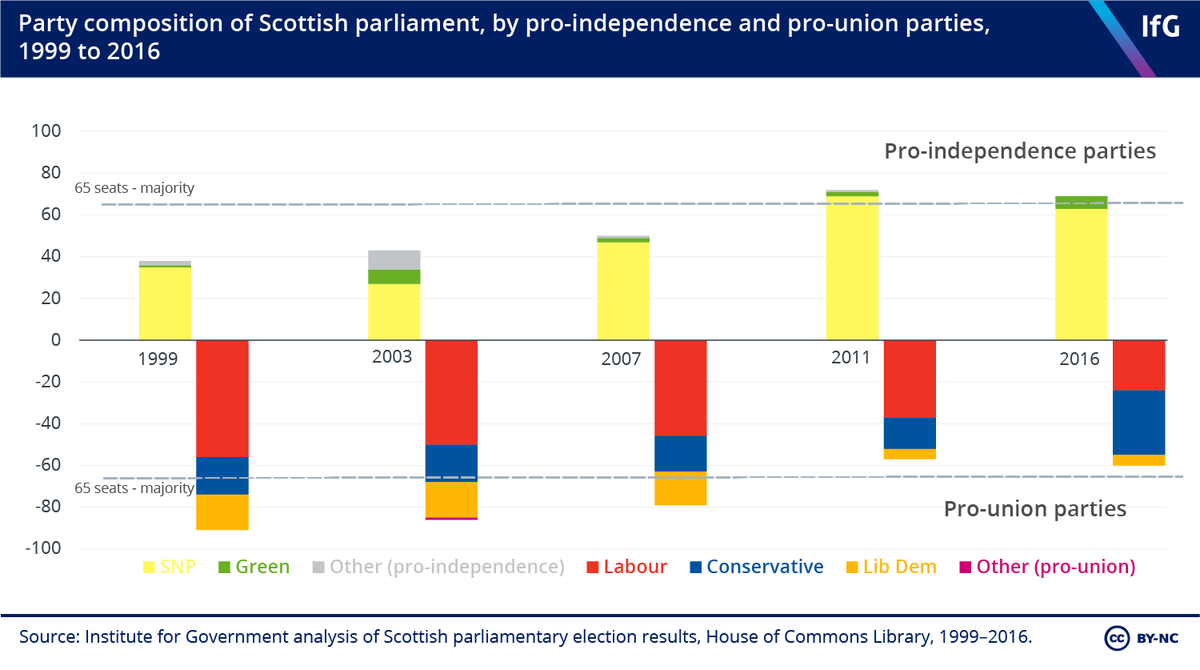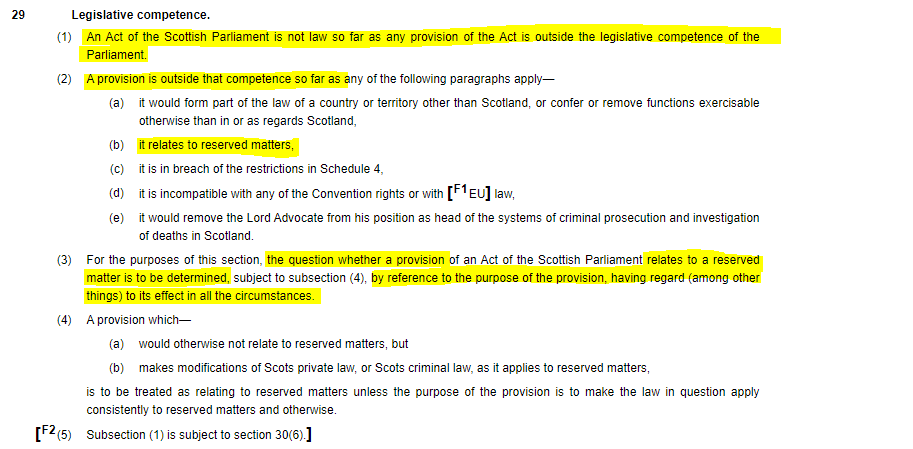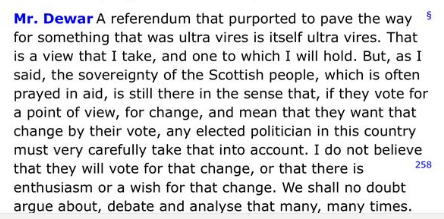There has been a pro-independence majority in the Scottish Parliament since 2011. If this is repeated in today& #39;s election (as pretty much all the polls predict), what happens next?
(A thread)
(A thread)
If the unionist parties outperform the polls and jointly win >64 seats then independence is off the agenda - at least until 2026. But the SNP will surely remain in government, as there& #39;s zero chance of a Lab-Con coalition. So Westminster-Holyrood relations will remain ... tricky.
If the SNP wins a majority on its own (as in 2011) or in combination with pro-indy allies (as in 2016) then we know what the initial move is likely to be: a request (based on a Scottish Parliament resolution?) for a Section 30 Order, empowering the Scot Parlt to hold a referendum
The Prime Minister is expected to #JustSayNo although the SNP expect that in the aftermath of a decisive nationalist victory, the UK Government might shift its line and accept that there is a legitimate mandate for a referendum to take place
The Scottish Conservatives - somewhat surprisingly - have also given credence to the idea that an SNP majority *would* lead to a referendum taking place. This might work as a way to motivate unionist voters, but it could also be a hostage to fortune.
If the Prime Minister does refuse the request for a Section 30 order, then the SNP intends to legislate to hold a referendum (after the pandemic) regardless. This & #39;Plan B& #39; is set out in the party& #39;s Roadmap to a Referendum https://www.thenational.scot/news/19033561.snps-road-scottish-independence-referendum-plan-full/">https://www.thenational.scot/news/1903...
If the Alba Party hold the balance of power, things could get interesting, as Alex Salmond is likely to press the Scottish Government to move faster and harder to secure independence. See our manifesto analysis here https://www.instituteforgovernment.org.uk/scotland-manifesto-tracker">https://www.instituteforgovernment.org.uk/scotland-...
Any attempt by the Scottish Parliament to legislate without the prior passage of enabling legisation by the UK Parliament (whether via a Section 30 order or an Act) will undoubtedly lead to the SNP legislation being referred, by the UK Government, to the UK Supreme Court.
The Court will be asked to judge whether a referendum bill falls outside the powers of the Scottish Parliament. The test is whether the bill "relates to" matters reserved to Westminster - namely "the Union" and "the UK Parliament", based on the "purpose and effect" of the bill
I am unqualified to predict what the Court might rule but it strikes me that the SNP have an uphill task in persuading the Court that their bill (published in draft: https://www.gov.scot/binaries/content/documents/govscot/publications/strategy-plan/2021/03/draft-independence-referendum-bill/documents/scottish-independence-referendum-bill-draft-publication/scottish-independence-referendum-bill-draft-publication/govscot%3Adocument/scottish-independence-referendum-bill-draft-publication.pdf)">https://www.gov.scot/binaries/... does not "relate to" the Union of Scotland and England.
As an aside, here is what Donald Dewar, Secretary of State for Scotland, said in 1998 when asked whether the new Scottish Parliament would be able to legislate to hold an independence referendum.
As others (I think @AileenMcHarg and @chrismccork) have pointed out, the UK Parliament would also have the option of amending the Scotland Act to make it explicit that even the holding of a referendum that relates to a reserved matter like the Union is beyond devolved competence
In this scenario, the Scottish Government would certainly cry foul - and the UK Government would surely prefer a referendum to be blocked by the Court than to have to go down this route. Either way, in terms of the law, it is not clear what cards the SNP would have left to play.
I have heard it said that international law (and the right to self-determination) might be invoked. However, the right to secede is usually recognised only in cases of colonialism, oppression etc. Otherwise, AIUI, the principle of territorial integrity is likely to prevail.
All this goes to show that the SNP& #39;s intended path to independence is strewn with obstacles and pitted with potholes, unless and until the UK Government accepts Scotland& #39;s democratic right to vote again on independence.
Consequently, many unionists will be expecting and supporting a blanket & #39;No, nae, never& #39; response from the Prime Minister to a request from Edinburgh for a Section 30 order. This would probably succeed in securing the integrity of the Union.
For the immediate term, at least.
For the immediate term, at least.
But looking at the longer term, the question for the Prime Minister (and unionists more generally) is whether the Union can function effectively and retain legitimacy on the basis of Westminster simply asserting its right to say no. (See recent paper by @ciaranmartinoxf on this).
In the end, unionists will surely have to fight and win this battle, by persuading a majority of voters in Scotland (and indeed the other UK nations) that their interests are best served by remaining within the UK.
I am yet to be convinced that the UK government has a coherent strategy for accomplishing this, but developing such a strategy must rank near/at the top of its list of priorities. You can be sure that @instituteforgov will be closely observing how the Govt goes about this. /END

 Read on Twitter
Read on Twitter





